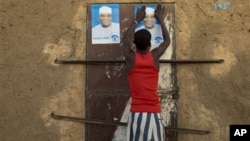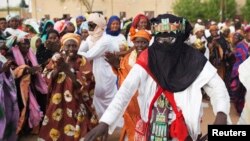Candidates in Mali have finished campaigning ahead of Sunday's crucial presidential election.
Twenty-seven candidates are competing to lead the West African country out of crisis. Mali is trying to recover from a turbulent period that included an ethnic Tuareg rebellion, a military coup, an Islamist occupation of the north, and a French-led military invention that is now being transformed into a U.N. mission.
Friday was the last day for campaign rallies and was also declared a public holiday to allow people time to collect their voter identification cards. Issues surrounding the distribution of the cards and errors on the voter list have sparked allegations of fraud and irregularities.
As campaigning ended, U.N. Secretary General Ban Ki-moon called for a peaceful vote and a transparent election process.
Story continues below photogallery
The head of the European Union observer mission in Mali, Louis Michel, said Friday that the team has been "pleasantly surprised" with conditions for the vote.
"The preparations are undoubtedly better than what we expected," he said. "So I say yes, I think these elections can take place in acceptable conditions that will not allow results to be tampered with. I think that the winner will have enough legitimacy to return the country to constitutional order and that is what is essential."
Some 7 million Malians are eligible to vote in the election to replace interim President Dioncounda Traore, appointed last year.
Michel said the European Union will have 100 observers on the ground Sunday. The Economic Community of West African States has the largest observer contingent with 250.
The top four challengers in the race include two former prime ministers - Ibrahim Boubacar Keita and Modibo Sidibe. The two other top candidates are Soumaila Cisse, who ran the West African Monetary Union, and a relative unknown, Dramane Dembele, who is backed by Mali's largest political party, ADEMA.
Among the other candidates getting some traction are the lone female candidate, Aichata Chada Haidara, and the mayor of Bamako's Commune IV district, Moussa Mara.
If no candidate wins a clear majority, the two top-scoring challengers will head to a runoff on August 11.
The former top U.S. diplomat for Africa, Johnnie Carson, told VOA this week that Mali's election will not be "perfect" but is important for restoring democracy and stability.
Twenty-seven candidates are competing to lead the West African country out of crisis. Mali is trying to recover from a turbulent period that included an ethnic Tuareg rebellion, a military coup, an Islamist occupation of the north, and a French-led military invention that is now being transformed into a U.N. mission.
Friday was the last day for campaign rallies and was also declared a public holiday to allow people time to collect their voter identification cards. Issues surrounding the distribution of the cards and errors on the voter list have sparked allegations of fraud and irregularities.
As campaigning ended, U.N. Secretary General Ban Ki-moon called for a peaceful vote and a transparent election process.
Story continues below photogallery
The head of the European Union observer mission in Mali, Louis Michel, said Friday that the team has been "pleasantly surprised" with conditions for the vote.
"The preparations are undoubtedly better than what we expected," he said. "So I say yes, I think these elections can take place in acceptable conditions that will not allow results to be tampered with. I think that the winner will have enough legitimacy to return the country to constitutional order and that is what is essential."
Some 7 million Malians are eligible to vote in the election to replace interim President Dioncounda Traore, appointed last year.
Michel said the European Union will have 100 observers on the ground Sunday. The Economic Community of West African States has the largest observer contingent with 250.
The top four challengers in the race include two former prime ministers - Ibrahim Boubacar Keita and Modibo Sidibe. The two other top candidates are Soumaila Cisse, who ran the West African Monetary Union, and a relative unknown, Dramane Dembele, who is backed by Mali's largest political party, ADEMA.
Among the other candidates getting some traction are the lone female candidate, Aichata Chada Haidara, and the mayor of Bamako's Commune IV district, Moussa Mara.
If no candidate wins a clear majority, the two top-scoring challengers will head to a runoff on August 11.
The former top U.S. diplomat for Africa, Johnnie Carson, told VOA this week that Mali's election will not be "perfect" but is important for restoring democracy and stability.






